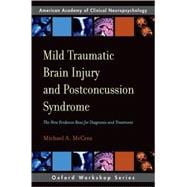
Note: Supplemental materials are not guaranteed with Rental or Used book purchases.
Purchase Benefits
What is included with this book?
| Introduction | p. ix |
| Continuing Education (CE) Credit | p. xiii |
| Author's Workshop Materials | p. xiii |
| Acknowledgments | p. xv |
| The TBI Landscape | p. 1 |
| Epidemiology and Impact of Traumatic Brain Injury | p. 3 |
| Zeroing In on MTBI: Epidemiology and Impact | p. 7 |
| Challenges in Defining and Diagnosing MTBI | p. 13 |
| Advances in MTBI Research Methodologies | p. 29 |
| Top 10 Conclusions | p. 37 |
| References | p. 39 |
| Basic and Clinical Science of MTBI | p. 43 |
| Biomechanics of MTBI | p. 45 |
| Neurophysiology of MTBI: The Neurometabolic Cascade | p. 53 |
| Neuroimaging in MTBI | p. 61 |
| Top 10 Conclusions | p. 71 |
| References | p. 73 |
| The Natural History of MTBI | p. 83 |
| Acute Symptoms and Symptom Recovery | p. 85 |
| Acute Cognitive Effects and Early Recovery | p. 97 |
| Neuropsychological Recovery | p. 109 |
| Influence of Acute Injury Characteristics on Recovery | p. 119 |
| Measuring Neurophysiologic Recovery | p. 125 |
| Functional Outcome After MTBI | p. 129 |
| Exceptions to the Rule: Potential Long-Term Effects of MTBI | p. 133 |
| Top 10 Conclusions | p. 138 |
| References | p. 140 |
| Implications for Rethinking Postconcussion Syndrome | p. 151 |
| Defining Postconcussion Syndrome | p. 153 |
| Nonspecificity of Postconcussion Syndrome Symptoms | p. 159 |
| Epidemiology of Postconcussion Syndrome: Another Denominator Problem | p. 163 |
| PCS as a Neuropsychological Disorder | p. 169 |
| Psychological Theories of Postconcussion Syndrome | p. 173 |
| Interventional Models for Postconcussion Syndrome | p. 177 |
| A Practical Model for Clinical Management of PCS | p. 181 |
| Top 10 Conclusions | p. 188 |
| References | p. 189 |
| Final Summary and Conclusions | p. 195 |
| Index | p. 197 |
| About the Author | p. 205 |
| Table of Contents provided by Ingram. All Rights Reserved. |
The New copy of this book will include any supplemental materials advertised. Please check the title of the book to determine if it should include any access cards, study guides, lab manuals, CDs, etc.
The Used, Rental and eBook copies of this book are not guaranteed to include any supplemental materials. Typically, only the book itself is included. This is true even if the title states it includes any access cards, study guides, lab manuals, CDs, etc.